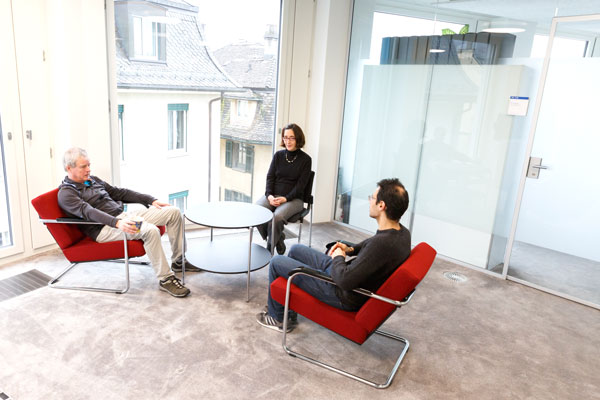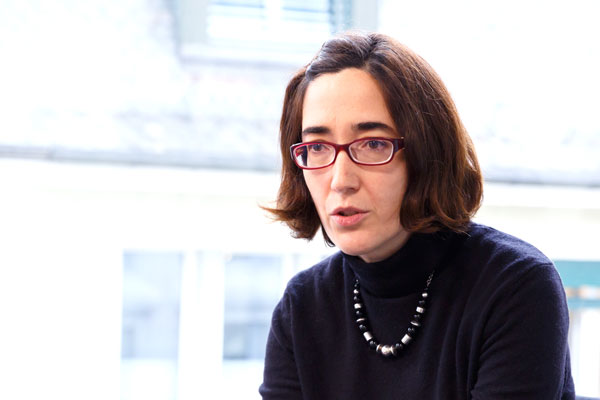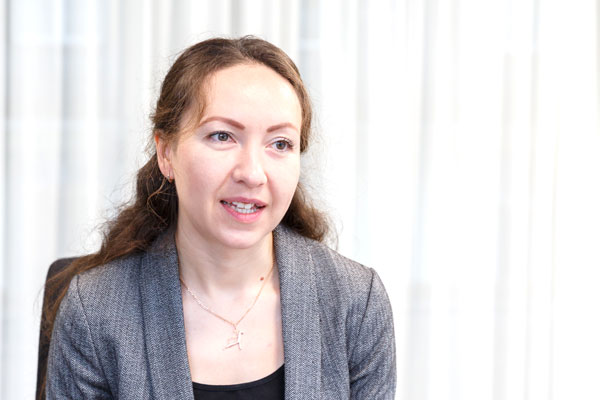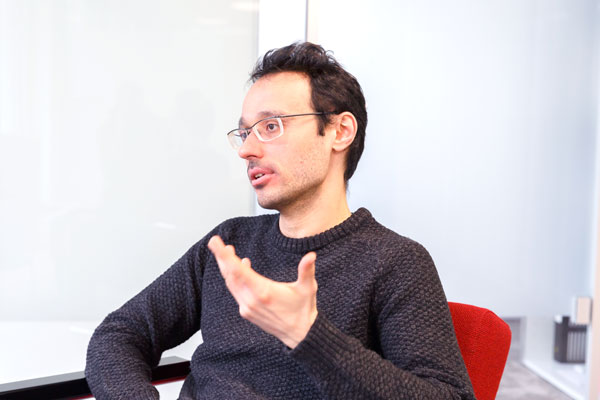
The power of data and how research impacts policy
How can financial crises be prevented? What policies and strategies are needed for the ideal handling of financial institutions and financial crises? Professor of Banking Steven Ongena is researching these global questions – also with the support of the ERC. A look into a complex but similarly very practical field.
The office resembles a greenhouse. The large room, with a floor-to-ceiling window on one side, houses around 30 plant pots in all sizes. They border the desk, line up next to the bookcase, adorn the coffee table – and all the plants are in top condition. When asked about the greenery, the Professor laughs and refers to a former colleague who would have had many more plants in her office.
The Department of Banking and Finance at the University of Zurich is located in a light-flooded, airy new building. A large lounge with a kitchenette, a glassed-in meeting room and a seating area with armchairs connects the individual offices, all with open doors almost throughout. There is a friendly, even familiar atmosphere in a well-coordinated team.
Steven Ongena and his colleagues explore three phenomena of the financial world in particular: the financial innovations of financial institutions, specifically the securitisation of bank loans and the issuance of minibonds; the widespread risk-taking of financial institutions and the information asymmetries they face in mortgage lending; and the high leverage of financial institutions and the correspondingly low equity ratios. The aim is to examine the impact of each factor on credit growth and then formulate appropriate policy recommendations on how to mitigate the effects of future financial crises. Or as Steven Ongena puts it: «We analyse factors, gather evidence and publish our findings to enable knowledge transfer, inform, educate and support decision makers in their work.»
Innovation implies a risk
Is one of the areas more important than the other? The banking expert says, no. All these elements are important, he states, but innovation is always dangerous: «If it is a normal business, you would think that all the actors involved would be able to overview the risks and that the regulators themselves would also be able to assess the risk taken. But when it comes to financial innovation, there is this additional risk.»
A learning from outside the industry: innovation is not a priori something positive. Steven Ongena compares the financial sector to the pharmaceutical industry in this context. There, too, would be a risk in production and a whole procedure. «To a certain extent, financial regulators have been inspired by the procedures of other countries, where pharmaceutical developments and innovations are very carefully scrutinised. You have to apply for certification,» he explains. In the financial sector, the supervisory authorities have often considered introducing such procedures.
«The connection
to the real world
is quite close.»
As bank customers, we would like to know a little more about bank loans. The Professor explains the field with the history of mini-bonds: during the financial crisis, especially in Europe, smaller companies no longer had access to bank loans. The reason was that the banking sector was under stress. That’s when the idea of a so-called spare tyre in the financial system emerged, through which small and medium-sized enterprises (SMEs) could gain access to other areas of the financial sector than the banking sector, especially the bond market. The spare tyre were the mini-bonds. To create them, some of the requirements for issuing bonds were lowered, allowing SMEs in Italy, Germany and other countries to access this mini-bond market – with some success.
Billions of data
Steven Ongena and his team are empirically researching the banking world using various databases. One of the most important additions recently is AnaCredit of the European Central Bank. The name stands for Analytical Credit Datasets. It was created in 2011 and contains all loans from 15 countries made by all institutions to all companies.
Micro-level data is contained in the EMIR (European Market Infrastructure Regulation) database. This collects all transactions between the largest institutions, totalling billions of pieces of information. It was also created due to the last financial crisis. «From a systemic point of view, it was thought that these databases could be helpful. Now dozens of people are trying to organise these data,» the researcher explains. The European Data Warehouse is another source of data, where all securities are documented together with their underlying loans. «With the information on the individual loans, you can create good securities that can then be sold to investors. So this securitisation is another way to expand the financing options for financial institutions, for banks.»
Banks may use the transaction repositories to see if a client has one or more outstanding payments on other loans and how much they are. Researchers can request access to the databases. «You spend a lot of time applying, but once you have a contract, you don’t have to resubmit it every time,» the scientist explains. But it also depends a bit on the project: «Especially when it comes to households, the standards are rightly very high. Then you have to specifically conclude a contract for a specific access.»
Continuous work
In total, Ongena’s team works with over a dozen such databases, one or more depending on the research topic. And there are many of them – regardless of the ERC’s financial contribution. Of course, this award is a moment when you receive funding and appreciation, the long-time team leader explains in this regard. But apart from that, there is an ongoing research agenda and each of the individual projects is triggered by specific questions, by the availability of certain data. «In the field I work in, it’s not like we say, ‘Now we get money and now we start a project.’ It is a continuous process and I have been doing this for many decades,» he explains. And he once again compares his field with pharmacy: «Empirical banking is many different projects, of course they are all interconnected and aimed at a certain assessment. But it’s not like saying, ‘Now we’re going to discover a new drug’, that’s not how it works.»
«When it comes
to financial innovation,
there is this
additional risk.»
However, there is one thing in common with the pharmaceutical industry: «The connection to the real world is quite close,» Ongena states, «like where people are directly researching the development of medicines.» Because in addition to the academic community, there is a large audience of policy-makers who also read and disseminate the research results. He is sometimes almost overwhelmed by the mass of reactions that his research results trigger in the political community, says the Professor. You deal with it all the time, and for good reason: «People need to know what the consequences are when they think about a policy.»
Many different research projects
For the staff members, however, the ERC contribution led to a career leap. Emilia Garcia-Appendini, for example, previously a Senior Researcher, organised a seminar that expanded the network of all participants and introduced her to the Norwegian Central Bank, which was interested in her research and now hired her. Her own research focuses on corporate finance, i.e. how companies respond to financial distress, the role of culture in credit decisions, and climate and finance.
Former PhD student Gazi Kabas studies household finance and banking and the interactions between these areas. He is now an Assistant Professor at Tilburg University, the Netherlands. Olga Briukhova’s final part of her PhD thesis was funded by the ERC Grant. She studied the impact of bank capital requirements on lending in Germany. She will continue her career in the private sector in a consulting firm here in Zurich. «The ERC helped me to complete my doctorate,» she states.
Mrinal Mishra’s doctoral thesis was also largely funded by ERC support. He looked at access to credit in developing countries and difficult circumstances such as in a political conflict. Now, as a postdoc, soon at the University of Melbourne, he is researching the impact of narratives in social media on entrepreneurship.
The Professor himself considers research on sustainable banking, i.e. on climate and physical risks, on bank lending as a consequence of climate policy decisions, as ongoing work. The connection to the real world could not be closer.
Interview with Steven Ongena
Steven Ongena
Steven Ongena is a Professor of Banking in the Department of Banking and Finance at the University of Zurich, a Senior Chair at the Swiss Finance Institute, a Research Professor at KU Leuven, a Research Professor at the Norwegian University of Science and Technology NTNU Business School, and a Research Fellow in Financial Economics at the Centre for Economic Policy Research CEPR. He is also a Research Professor at the Deutsche Bundesbank and a regular Research Visitor at the European Central Bank. Originally from Belgium, he studied at the University of Alberta in Edmonton, Canada, in 1988, did his doctorate at the University of Oregon, USA, until 1995, and worked at CentER-Tilburg University in the Netherlands and the BI Norwegian Business School before being appointed to Zurich.
Horizon 2020 Project
lending: Drivers of Growth in Bank Lending and Financial Crises
- Programme: ERC Advanced Grant
- Duration: 1. September 2017 – 31. August 2022 (60 months)
- Contribution for University of Zurich: 2‘103‘440 €







